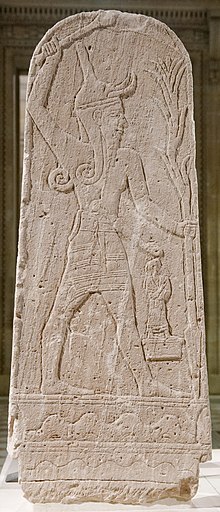Ba‘al
| Ba'al | |
|---|---|
| God of fertility, weather, rain, wind, lightning, seasons, war, patron of sailors and sea-going merchants, leader of the Rephaim(ancestral spirits) Later views: King of the gods |
|

The stele of Baal with Thunderbolt found in the ruins of Ugarit
|
|
| Symbol | Bull, Sheep |
| Parents | Dagan (usual lore) El (some Ugaritic texts) |
| Siblings | Anat |
| Region | At and near Canaan Near, around and at Ugarit Egypt(middle kingdom of) |
Baal (/ˈbeɪəl/), properly Baʿal (Ugaritic: ;Phoenician: ; Biblical Hebrew: , pronounced [ˈbaʕal]), was a title and honorific meaning "lord" in the Northwest Semitic languages spoken in the Levant during antiquity. From its use among people, it came to be applied to gods. Scholars previously associated the theonym with solar cults and with a variety of unrelated patron deities, but inscriptions have shown that the name Baʿal was particularly associated with the storm and fertility god Hadad and his local manifestations.
The Hebrew Bible, compiled and curated over a span of centuries, includes early use of the term in reference to their God Yahweh, generic use in reference to various Levantine deities, and finally pointed application towards Hadad, who was decried as a false god. That use was taken over into Christianity and Islam, sometimes under the opprobrious form Beelzebub in demonology.
...
Wikipedia
